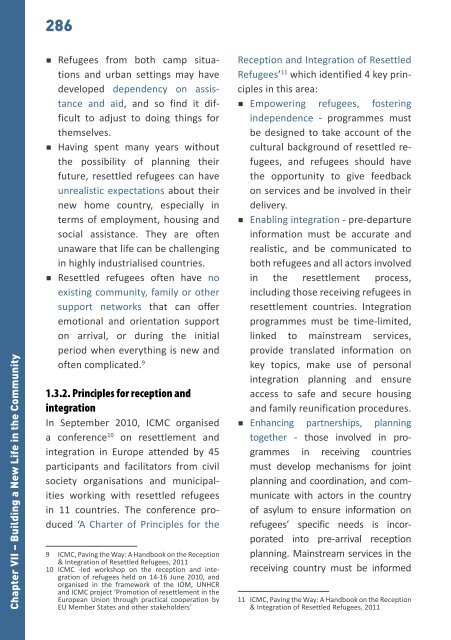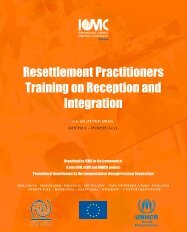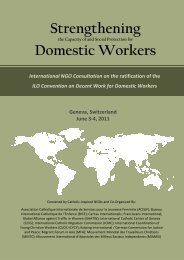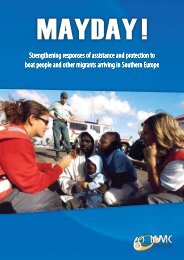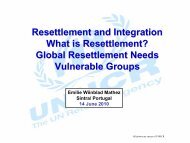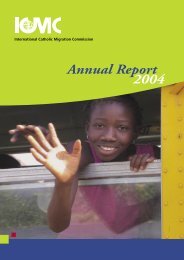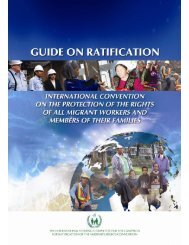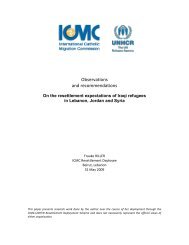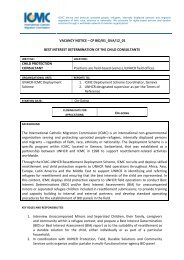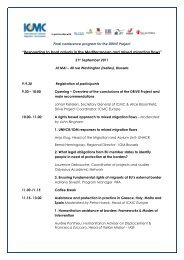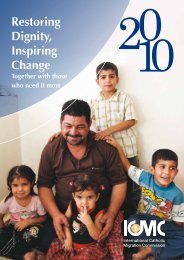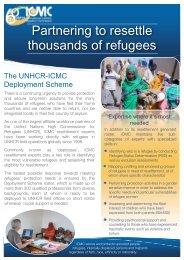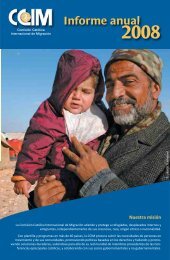ICMCEUROPE WelcometoEurope.pdf (5.89 MB)
ICMCEUROPE WelcometoEurope.pdf (5.89 MB)
ICMCEUROPE WelcometoEurope.pdf (5.89 MB)
Create successful ePaper yourself
Turn your PDF publications into a flip-book with our unique Google optimized e-Paper software.
286<br />
Chapter VII – Building a New Life in the Community<br />
• Refugees from both camp situations<br />
and urban settings may have<br />
developed dependency on assistance<br />
and aid, and so find it difficult<br />
to adjust to doing things for<br />
themselves.<br />
• Having spent many years without<br />
the possibility of planning their<br />
future, resettled refugees can have<br />
unrealistic expectations about their<br />
new home country, especially in<br />
terms of employment, housing and<br />
social assistance. They are often<br />
unaware that life can be challenging<br />
in highly industrialised countries.<br />
• Resettled refugees often have no<br />
existing community, family or other<br />
support networks that can offer<br />
emotional and orientation support<br />
on arrival, or during the initial<br />
period when everything is new and<br />
often complicated. 9<br />
1.3.2. Principles for reception and<br />
integration<br />
In September 2010, ICMC organised<br />
a conference 10 on resettlement and<br />
integration in Europe attended by 45<br />
participants and facilitators from civil<br />
society organisations and municipalities<br />
working with resettled refugees<br />
in 11 countries. The conference produced<br />
‘A Charter of Principles for the<br />
9 ICMC, Paving the Way: A Handbook on the Reception<br />
& Integration of Resettled Refugees, 2011<br />
10 ICMC -led workshop on the reception and integration<br />
of refugees held on 14-16 June 2010, and<br />
organised in the framework of the IOM, UNHCR<br />
and ICMC project ‘Promotion of resettlement in the<br />
European Union through practical cooperation by<br />
EU Member States and other stakeholders’<br />
Reception and Integration of Resettled<br />
Refugees’ 11 which identified 4 key principles<br />
in this area:<br />
• Empowering refugees, fostering<br />
independence - programmes must<br />
be designed to take account of the<br />
cultural background of resettled refugees,<br />
and refugees should have<br />
the opportunity to give feedback<br />
on services and be involved in their<br />
delivery.<br />
• Enabling integration - pre-departure<br />
information must be accurate and<br />
realistic, and be communicated to<br />
both refugees and all actors involved<br />
in the resettlement process,<br />
including those receiving refugees in<br />
resettlement countries. Integration<br />
programmes must be time-limited,<br />
linked to mainstream services,<br />
provide translated information on<br />
key topics, make use of personal<br />
integration planning and ensure<br />
access to safe and secure housing<br />
and family reunification procedures.<br />
• Enhancing partnerships, planning<br />
together - those involved in programmes<br />
in receiving countries<br />
must develop mechanisms for joint<br />
planning and coordination, and communicate<br />
with actors in the country<br />
of asylum to ensure information on<br />
refugees’ specific needs is incorporated<br />
into pre-arrival reception<br />
planning. Mainstream services in the<br />
receiving country must be informed<br />
11 ICMC, Paving the Way: A Handbook on the Reception<br />
& Integration of Resettled Refugees, 2011


